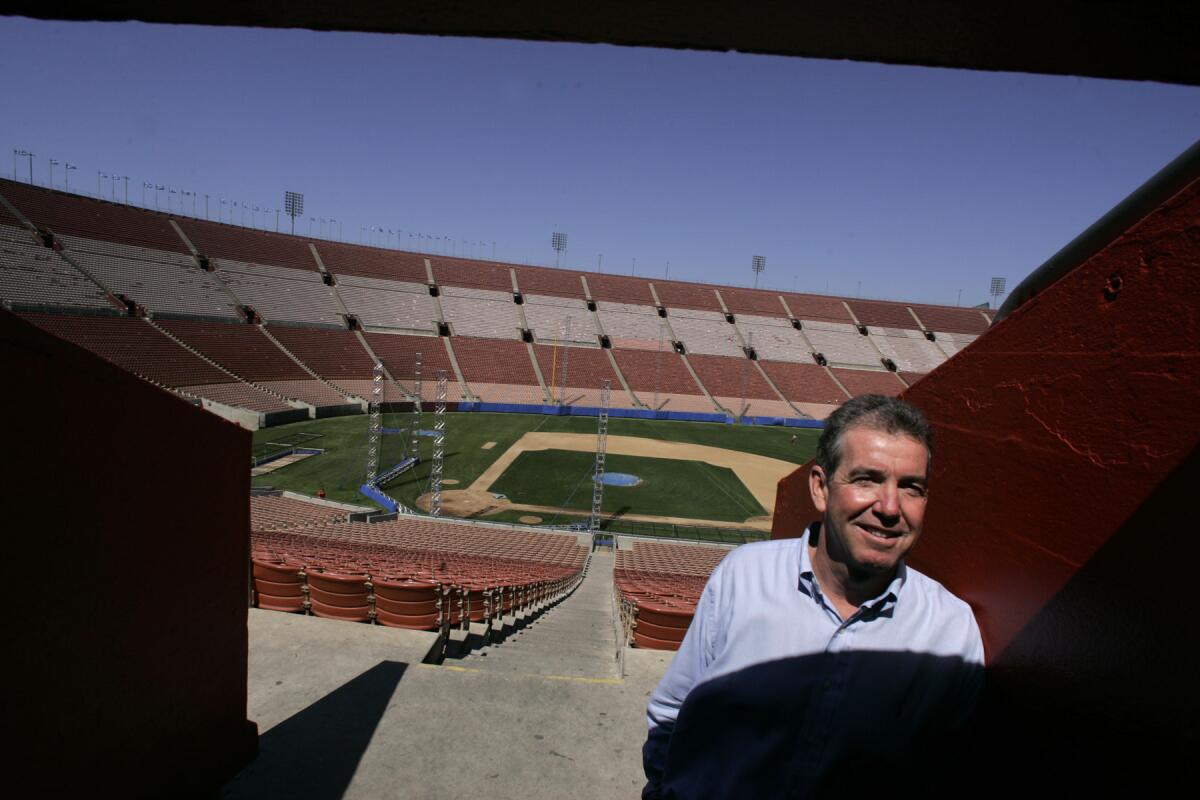Commissioners to discuss Coliseum manager’s future

The longtime general manager of the Los Angeles Memorial Coliseum could find his job in jeopardy Tuesday when his bosses meet behind closed doors to discuss his decision to allow a top assistant to double as a paid consultant to the producer of a controversial rave at the stadium.
The nine-member Coliseum Commission has scheduled a special session at the Kenneth Hahn Hall of Administration to take “possible action” on general manager Patrick Lynch’s employment, the panel said in a terse announcement Monday.
The Times has reported that Lynch allowed Todd DeStefano, then his events manager, to work for the company that staged last June’s Electric Daisy Carnival even as he represented the commission in planning and overseeing security and medical services for the rave. The concert was marked by numerous drug overdoses and the death of a teenage girl.
As he sought to bring Electric Daisy back to the Coliseum this year, DeStefano also retained a lobbyist to contact City Council members and other officials, according to records and interviews.
“We’re getting together to do what we can to protect the integrity of the Coliseum and assure the long-term well-being of the Coliseum,” said Commission President David Israel. He declined to elaborate on what actions might be taken at Tuesday’s meeting.
A source close to the commission, who requested anonymity because of the confidential nature of the meeting, said the panel could place Lynch on administrative leave while it conducts an internal inquiry into his dealings with DeStefano. Already underway are separate investigations of DeStefano by local prosecutors and the state’s ethics watchdog.
Telephone calls seeking comment from Lynch and DeStefano on Monday were not returned.
After the initial Times story on DeStefano’s ties to the Electric Daisy producer, Insomniac Inc., Commissioner Rick Caruso demanded Lynch’s resignation. Caruso declined to comment Monday.
Lynch has managed the Coliseum and the neighboring Los Angeles Memorial Sports Arena, which the commission also operates, since 1994. In the past, he was a key player in the commission’s star-crossed efforts to lure a professional football team back to the Coliseum and in its sometimes testy negotiations with USC over the Trojans’ lease of the stadium. Lynch made about $275,000 in salary and bonus pay last year.
Giant raves such as Electric Daisy have generated an increasing share of the commission’s revenues. The 2010 Electric Daisy drew an announced crowd of 185,000 over two days. Police officials said there was widespread drug use and too little security at the event. About 120 attendees were taken to the hospital, mostly for drug intoxication, and there were 118 arrests. Sasha Rodriguez, 15, died of an Ecstasy overdose.
The problems at Electric Daisy led to a moratorium on raves that the commission lifted in November.
Commissioners have said they had no idea that DeStefano worked simultaneously for the Coliseum and Insomniac before and after Electric Daisy. Insomniac had a financial stake in DeStefano’s work for the commission on security and emergency services because the company had to pay some of the costs.
Lynch and DeStefano have said Insomniac’s bottom line had no effect on their safety standards.
DeStefano continued in his dual roles until last month, when Israel learned of the situation and directed Lynch to order DeStefano to chose between his two employers. DeStefano resigned to pursue a full-time career as an events promoter, including for Insomniac.
The Times reported Monday that DeStefano hired a City Hall lobbyist last year during the rave moratorium. He retained Paul Vizcaino, a former aide to Councilman Jose Huizar, through a company he launched in 2009, Private Event Management, according to city records.
.
More to Read
Sign up for Essential California
The most important California stories and recommendations in your inbox every morning.
You may occasionally receive promotional content from the Los Angeles Times.










